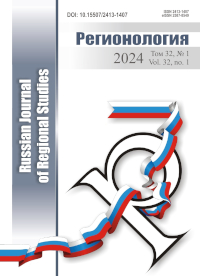D. G. Desyaev, I. G. Napalkova. The Nagorno-Karabakh Conflict: a Chain Reaction Against a Background of the Events in Ukraine
D. G. Desyaev, I. G. Napalkova. The Nagorno-Karabakh Conflict: a Chain Reaction Against a Background of the Events in Ukraine
Key words: region; Nagorno-Karabakh; conflict; Armenia; Azerbaijan; Ukraine; conflict escalation; territorial integrity; right of nations to self-determination
Introduction: the events in Ukraine have influenced the aggravation of the frozen Nagorno-Karabakh conflict, which is an alarming situation for Russia and the European Union. The Nagorno-Karabakh conflict is one of the fiercest territorial disputes in the post-Soviet space. In 1994, the Bishkek Protocol came into force, which put an end to the bloodshed. Since August 2014, the escalation of the conflict has begun which can lead to a chain reaction and go beyond the South Caucasus, which will adversely affect the security of the entire region. The crisis in Ukraine exacerbated the Armenian-Azerbaijani confrontation: the number of clashes has increased and calls for a military solution to the dispute has begun to be made more and more often on both sides.
Materials and Methods: works by experts on the Nagorno-Karabakh conflict as well as statements by officials, politicians and public figures were used as research materials. The study uses the comparative political science method, the semantic and the scenario ones, etc.
Results: the impact of the Ukrainian crisis on the Nagorno-Karabakh conflict was analyzed. The degree of interest of the parties in its escalation was studied as well as the impact on the conflict of the countries concerned. The failure of the Minsk Group to settle the conflict was exposed.
Discussion and Conclusions: possible scenarios for the development of the conflict were developed. These scenarios clearly reflect the positive and negative factors for the warring parties.
REFERENCES
1. Shukyurov K. [On Autonomy for Nagorno-Karabakh: Lessons of History]. Kavkaz i globalizacija = The Caucasus&Globalization. 2008; 2:160—172. Available at: https://www.ca-c.org/c-g/2008/journal_rus/c-g-2/13.shtml (accessed 01.07.2017). (In Russ.)
2. Ryabtsev V.N. [Negotiations Process of Nagorny Karabah Undermodern Conditions: if its Format is Adequate]. Filosofija prava = Philosophy of Law. 2009. 4:60—66. Available at: https://cyberleninka.ru/article/n/peregovornyy-protsess-po-nagornomu-kar... (accessed 01.07.2017). (In Russ.)
3. Petithomme M. L’état de Facto du Haut-Karabagh Arménien. Entre Démocratisation en Trompe-l’oeil et Ethnicisation. Revue Internationale et Strategique. 2013; 1(89):30—39. DOI: https://doi.org/10.3917/ris.089.0030
4. Swietochowski T. Azerbaijan: Perspectives from the crossroads. Central Asian Survey. 1999; 4(18):419—434. DOI: https://doi.org/10.1080/713656170
Contribution of the authors:
Dmitry G. Desyaev — writing the initial version of the text of the article, search for analytical materials.
Irina G. Napalkova — academic advising, drawing conclusions, final revision of the text of the article.
About the authors:
Dmitry G. Desyaev, Student Pursuing a Master’s Degree, National Research Mordovia State University (68 Bolshevistskaya St., Saransk, 430005, Russia) (е-mail: exprise@mail.ru). ORCID: https://orcid.org/0000-0003-4353-4400.
Irina G. Napalkova, Candidate of Historical Sciences, Associate Professor at the Department of World History, Political Science and Regional Studies, National Research Mordovia State University (68 Bolshevistskaya St., Saransk, 430005, Russia) (е-mail: zamisi@yandex.ru). ORCID: https://orcid.org/0000-0003-3896-1600.
For citation: Desyaev D.G., Napalkova I.G. The Nagorno-Karabakh Conflict: a Chain Reaction against a Background of the Events in Ukraine. REGIONOLOGIYA = REGIONOLOGY. 2018; 1(26):9—27. DOI: 10.15507/2413-1407.102.026.201801.9-27

All the materials of the "REGIONOLOGY" journal are available under Creative Commons «Attribution» 4.0















